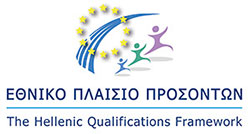What is the connection between the Hellenic Qualifications Framework and the European Qualifications Framework?
Common points of the Hellenic and the European Qualifications framework:
- HQF is a structure of eight levels, defined by level descriptors.
- HQF is a comprehensive and integrated framework, designed to relate to qualifications awarded for
- all learning, whether acquired through formal, non-formal or informal processes, or through learning
- all learning, whether acquired through formal, non-formal or informal processes, or through learning
- In the HQF, the statements that define the levels are completely neutral in terms of fields of learning.
- In the HQF the level descriptors are designed to be read across all strands of learning outcomes, and aspects of each strand are sometimes elaborated or clarified in other strands; also, the outcomes for a given level build on and subsume the outcomes of the levels beneath.
- In the HQF, key words or phrases are introduced as ‘threshold’ or distinguishing factors in the description of learning outcomes at each level.
- Taking all of the above into account, it can be concluded that the HQF and the EQF share core design criteria and this indicates that a direct comparison of the levels in the two frameworks is feasible.
Points of differentiation between the HQF and the European Qualifications Framework
- The structure of the European Qualifications Framework is simpler compared to the Hellenic Qualifications Framework, as the latter introduces an additional series of "Types of qualifications".
- The level descriptors of the HQF are more elaborate compared to the ones of the EQF.

 Greek
Greek  English
English 



